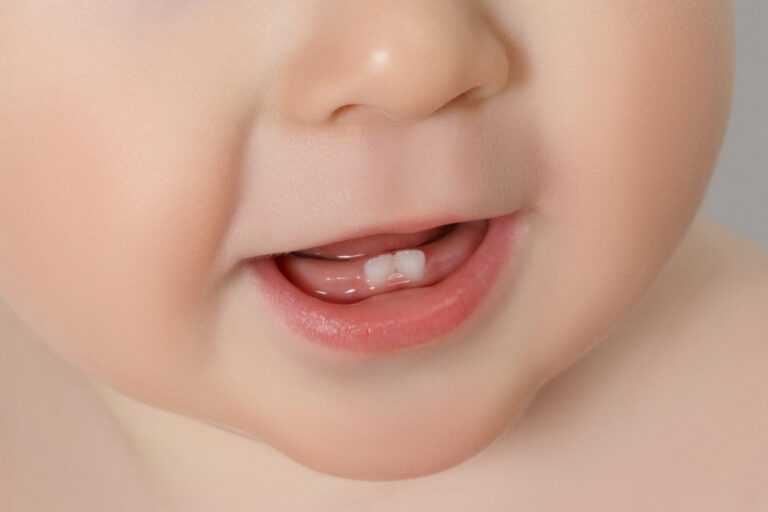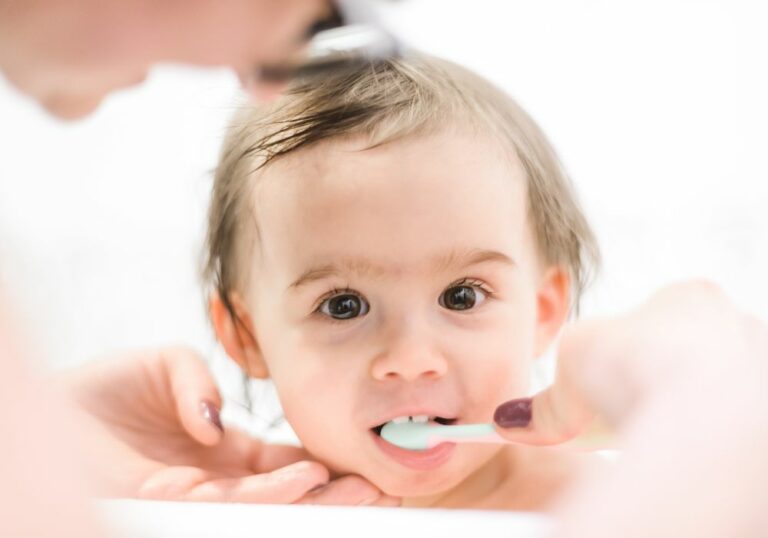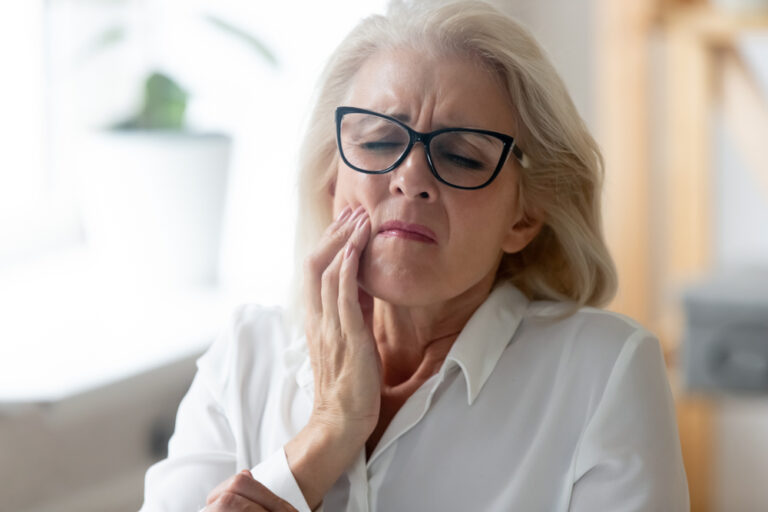Tooth sensitivity or pain when brushing is an extremely common problem affecting people of all ages. There are many possible causes, ranging from minor to severe, that could explain why you feel pain or discomfort when brushing your teeth. Identifying the specific reason is key to getting the right treatment and finding relief.
What Triggers Tooth Pain When Brushing?
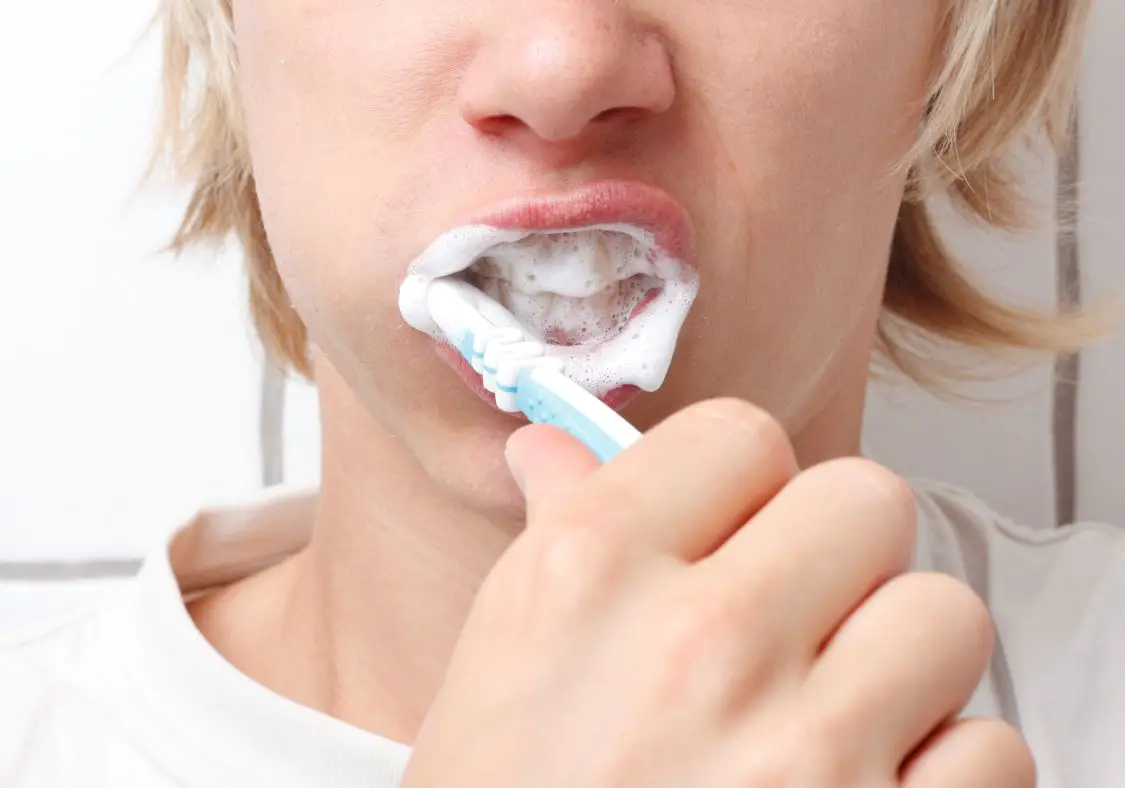
There are a number of potential culprits behind tooth pain during brushing:
Exposed Dentin
One of the most frequent explanations for tooth sensitivity and irritation is exposed dentin. The hard, outer enamel layer that protects the tooth can become worn down over time from factors like chewing acidic foods, grinding teeth at night, and brushing too aggressively. This reveals the softer, inner layer called dentin underneath.
Dentin contains thousands of tiny tubules leading directly to the nerve of the tooth. When the dentin is exposed, cold, heat, air, sugary or acidic foods, and brushing can stimulate the nerve through these tubules and cause sharp, sudden pain. The discomfort is often brief and ceases once the trigger is removed.
Dental Caries (Cavities)
Dental caries, or cavities, are areas of decay in the hard surface of a tooth. They form when plaque bacteria on the tooth metabolize sugars and ferment them into acids. These acids eat away at the enamel and dentin, creating holes in the structure. As a cavity extends deeper towards the inner pulp and nerves, any irritation like brushing can cause lingering pain.
Cracks or Fractures
Cracks or fractures in a tooth can also lead to pain when brushing. Cracks create pathways for food particles, debris, and bacteria to enter the tooth and inflame the inner pulp tissue. Vertical cracks are often more painful as they extend down towards the root. Horizontal cracks across the top of the tooth may cause discomfort but are less severe.
Gum Recession
Gum recession occurs when the margin of the gums around the tooth root start to pull away, revealing more of the tooth surface and roots. Periodontal disease, aggressive brushing, hormonal changes, and other factors can cause the gums to recede. With more exposed root area, brushing may irritate the surface and cause tooth pain.
Periapical Dental Abscess
A tooth abscess happens when a bacterial infection develops inside the pulp chamber of the tooth or in the surrounding bone. Abscesses cause throbbing pain, tooth sensitivity, swelling, and can spread infection through the body if left untreated. Brushing a tooth with an abscess will likely cause severe pain by aggravating the infection.
Recent Dental Work
It’s quite common to experience some tooth sensitivity after certain dental procedures like getting a filling, crown, veneers, braces, or even a professional cleaning. The tooth may remain sensitive for a period of weeks up to several months as it recovers from the irritation of drilling or scaling during treatment. Gentle brushing technique can help avoid making pain worse in recently treated teeth.
Less Common Causes
While the above reasons are most prevalent, other less common possibilities include:
- Bruxism: Nighttime teeth grinding wears down enamel and causes pain when brushing.
- Enamel hypoplasia: Thin, weak enamel that exposes sensitive dentin.
- Oral cancer: Unexplained pain that persists warrants an exam to check for serious issues.
- Allergies: Rare allergies to toothpaste ingredients can cause burning pain when brushing.
When To Seek Professional Dental Help

In many cases, sensitivity from exposed dentin or recent dental work will resolve on its own within a few weeks using gentle brushing and desensitizing toothpaste. However, you should visit your dentist promptly if you have:
- Consistent, severe tooth pain that disrupts sleep or daily life
- Swelling in the gums or face
- Loose teeth, chips, cracks, or other visible damage
- Bleeding gums that won’t stop
- Sudden sharp pains from hot or cold foods/drinks
- An abscess or infection
The dentist has many options to treat tooth pain and sensitivity caused by various issues. Getting problems diagnosed early prevents more extensive dental work later on. Urgent dental care clinics can provide prompt treatment if you have a painful emergency outside regular office hours.
How Dentists Diagnose Tooth Pain When Brushing
Dentists use a combination of diagnostic techniques and tools to pinpoint what is causing discomfort when brushing:
Visual Exam
A clinical visual inspection of all teeth, gums, sides of the mouth, tongue, etc. Checks for decay, fractures, gum recession, swelling, redness, and other warning signs.
Dental X-Rays
Intraoral x-ray images help dentists detect issues beneath the visible tooth surface such as cavities, hidden cracks, abscesses, cysts, and bone loss which require treatment.
Cold Sensitivity Testing
Applying cold air or ice to the surface of teeth can provoke a sharp pain response in those with exposed dentin tubules. This helps identify problematic areas.
Percussion Testing
Gently tapping on teeth with a tool to check for pain or discomfort, which may indicate an abscess, fracture, or other problem.
Bite Pressure Testing
Having the patient bite down on a cotton swab or stick to check for pain that points to a cracked tooth.
Periodontal Probing
A periodontal probe is inserted between the tooth and gums to measure pocket depth around each tooth. Checks for gum recession.
Transillumination
Shining a bright light through the tooth to help detect subtle cracks that may not show up on x-rays.
Possible Treatments To Stop Tooth Pain When Brushing
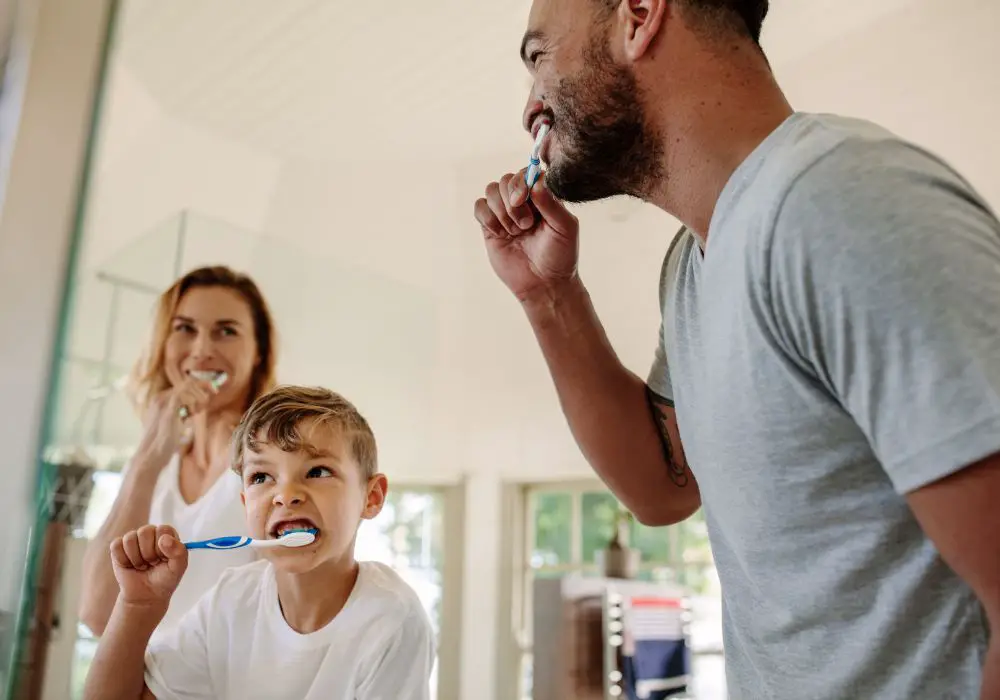
The treatment recommended will depend on the specific cause of discomfort identified during the dental examination. Options dentists commonly use include:
Dental Fillings or Crowns
Fillings remove decay and restore the tooth structure. Crowns cap damaged or cracked teeth. This prevents irritation of the inner pulp.
Root Canal Therapy
If the pulp is infected, a root canal removes the inflamed pulp, cleans and shapes the interior root canals, and seals the interior space.
Gum Grafting Surgery
Grafting healthy gum tissue over exposed roots can treat sensitivity from gum recession.
Fluoride Treatments
Applying higher concentration fluoride helps strengthen enamel, prevent cavities that cause pain, and reduce dentin hypersensitivity.
Desensitizing Toothpastes
Special toothpastes contain active ingredients like stannous fluoride or strontium chloride to coat exposed dentin and seal tubules.
Dental Bonding
Bonding material applied to exposed root surfaces acts as a protective seal against sensitivity.
Antibiotics and Drainage
Antibiotics, incision, and drainage treat abscesses. Resolves infection and swelling to stop pain.
Nightguards and Mouthguards
Guards protect against grinding/clenching and the resulting enamel wear, cracks, and sensitivity.
Self-Care Remedies for Tooth Pain When Brushing
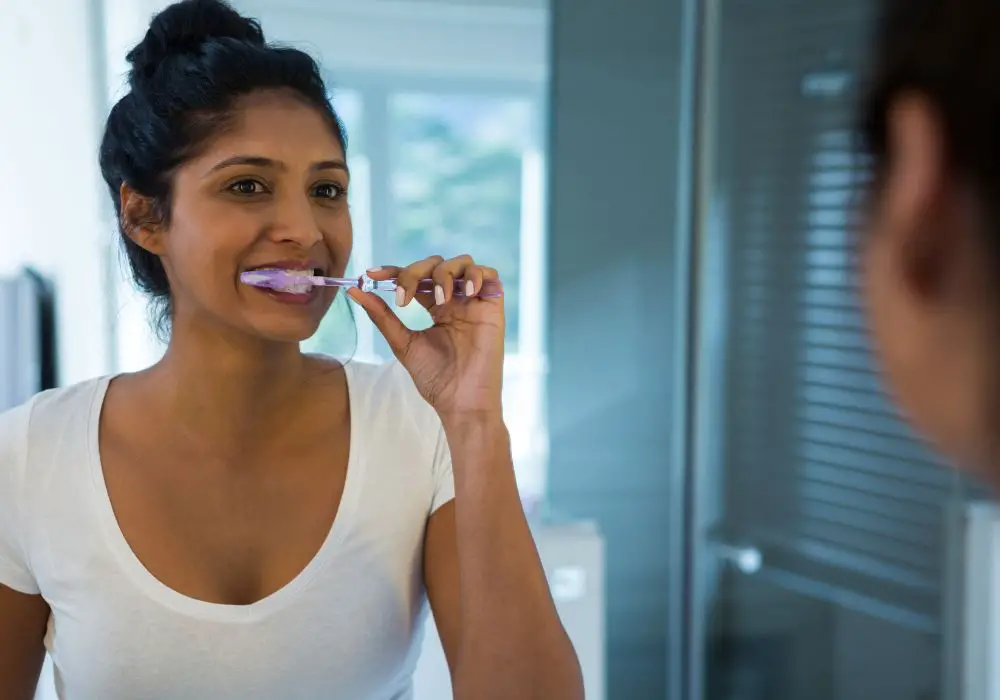
Alongside professional dental treatment, you can use self-care remedies at home to soothe tooth discomfort when brushing:
- Switch to a soft-bristled toothbrush and brush gently using small circles
- Choose toothpaste made for sensitive teeth
- Rinse with warm salt water to reduce inflammation
- Take over-the-counter pain medication like ibuprofen to temporarily relieve pain
- Avoid highly acidic or sugary foods/drinks that erode enamel
- Don’t brush right after consuming acidic foods
- Use dental wax to cover a sensitive cracked tooth temporarily
- Try brushing with a fluoride mouthwash for added protection
- Wear a nightguard if you clench/grind your teeth when sleeping
See your dentist regularly for checkups and cleanings to prevent issues like cavities and gum disease that can lead to sensitivity and discomfort when brushing. Catching problems early is key.
When To Visit An Emergency Dentist
In most cases, sensitivity and pain when brushing teeth does not constitute a dental emergency. However, you should seek emergency dental treatment immediately if you experience:
- Uncontrolled, severe toothache and pain
- Visible trauma like a cracked, displaced, or knocked-out tooth
- Significant facial or oral swelling
- Bleeding from the mouth that won’t cease
- Difficulty breathing or swallowing
- Severe pain and infection after oral surgery
Urgent dental clinics can provide same-day treatment outside regular office hours for emergencies involving serious tooth pain, swelling, trauma, or unstoppable bleeding. Prompt care prevents complications and tooth loss.
Conclusion
Discomfort, pain, or sensitivity when brushing your teeth is quite common but should never be ignored. Possible causes include exposed dentin, decay, cracks, receding gums, abscesses, recent dental work, and bruxism. See a dentist promptly if you experience persistent or severe brushing discomfort for an exam and diagnosis. Treatments like fillings, gum grafting, nightguards, root canals, or tooth extractions can resolve the underlying problem so you can brush comfortably again. With proper dental care, tooth brushing should not be a painful torment.
Frequently Asked Questions
Q: Why are my teeth super sensitive all of a sudden when I brush?
A: Sudden sensitivity when brushing after years of no issues usually indicates a new problem like a crack, cavity, or receding gums. See your dentist promptly to determine the cause and recommended treatment.
Q: Can I brush too hard and damage my teeth?
A: Yes, aggressive brushing over time can wear down enamel and expose sensitive dentin. Use gentle circular motions and a soft bristle brush. Let the brush do the work.
Q: If I avoid brushing the painful tooth will it get better?
A: No, you should still gently brush the sensitive tooth twice daily to prevent plaque buildup which will worsen decay or infection. Seek professional treatment for sensitivity relief.
Q: How long should sensitivity last after a filling?
A: It’s normal for a newly filled tooth to be sensitive for a few weeks up to several months as it heals. If sensitivity persists beyond 6-8 weeks, contact your dentist to check for issues.
Q: What toothpaste ingredients help with sensitivity?
A: Look for desensitizing toothpastes containing stannous fluoride, arginine, strontium chloride, or potassium nitrate. These can block nerve signals that cause pain.



